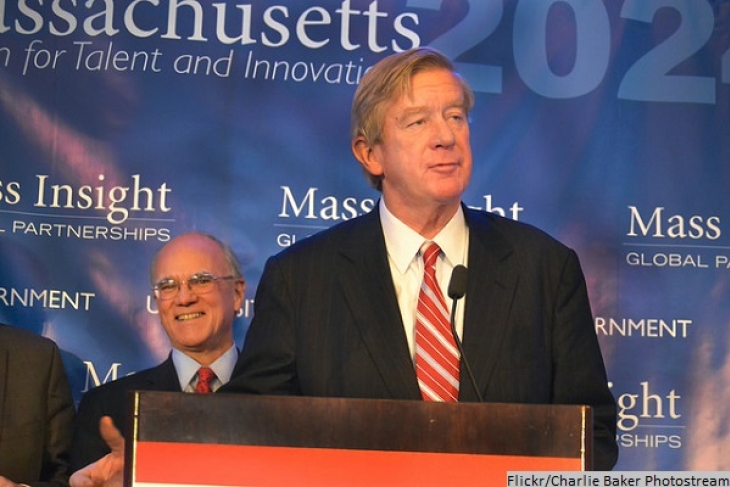William Weld, the former governor of Massachusetts, is the Libertarian Party’s vice presidential candidate, running alongside Gary Johnson. The duo will face off in November against Republican Party's Donald Trump and Mike Pence and Democratic Party's Hillary Clinton and Tim Kaine. Here are some of Weld’s views on education.
- Common Core: “The Common Core proposes that we go to informational texts rather than literature, that we cut back on useless appendages like Dickens and Wharton and Arthur Conan Doyle and Mark Twain in exchange for global awareness and media literacy, cross-cultural flexibility and adaptability. These are our new standards. I don’t know about no more Little Dorrit, no more Dombey and Son, no more Ethan Frome, no more Study in Scarlet, no more Speckled Band, no more Hound of the Baskervilles, not even The League of Red-Headed Men—not to mention Huckleberry Finn, the greatest American novel. So I’m not so sure about the Common Core approach to things. It kind of looks to me like an apology for muddleheaded mediocrity.” June 2013.
- Common Core, part 2: “My suggestion to [Massachusetts] Governor Patrick and the leadership would be: By all means, adopt the Common Core lock, stock, and barrel, and just add the MCAS and all our standards and all our accountability without really rubbing it in anyone else’s face, or saying they have to do it. That way we would do the president a political favor, and we’d still have our cake and eat it too.” June 2013.
- Uniform national standards: “[Massachusetts’s unique curriculum] is a competitive advantage Massachusetts has. If you say, 'Let's have one national standard,' then we're the same as everyone else. That makes no sense to me.” July 2010.
- Charter schools: “The one time I had a following wind [while testifying before the legislature as governor of Massachusetts]…the topic was charter schools. And I was all in favor of charter schools, and I was saying we should give them real estate, and we need to empower them, and there was a very frowny set of individuals up on the dais—the education chairs, a couple of members. And one reason they might’ve been frowning was because there were huge cheers from behind me, from 350 people who had jammed the hearing room, anytime I said anything.…And the people looking out from the dais at the room would not have seen a single white face in that room except for mine. These were inner-city parents who understood that they and their kids were being robbed by the current system of education, and charter schools offered them a way up and a way out.” June 2013.
- Charter school caps: “The cap [in Massachusetts] has got to be lifted. We have a waiting list of 53,492 kids who want to get into charter schools and can’t because of the cap. Parents and kids are voting with their feet, and we should respect that.” June 2013.
- Charter school providers: “We should remove the “proven-provider” requirement for underserved districts. That requirement is contrary to the spirit of innovation, which is the motivation for charter schools in the first place. If you can’t trust anyone except a proven provider, you shouldn’t have trusted anyone to start a charter school in the first place. It’s just not logical.” June 2013.
- Cost of a good education: “If you want a great education, you do have to pay for it.” June 2013.
- Education as our top priority: “If you can guarantee that education dollars are spent in the classroom, it’s very hard to see a higher priority than creating a quality education for our children.” June 2013.
- Education “grand bargain”: “I was proud to be part of the so-called “grand bargain”—more money in exchange for standards and accountability. From where I stood, it wasn’t a grand bargain at all—it wasn’t a comprise at all—because I was in favor of both halves of it.” June 2013.
- Teachers unions: “[Testifying before the legislature] I held up a brochure of the teachers’ union, and that produced a lightening of the mood and a brightening from the faces on the dais—they thought I was going to read from it, and so I did. I read several passages, and at the conclusion I said, ‘So these are representative passages, chair and chair, and in total, if you read the entire brochure, you would see thirty-seven references to money and political influence.’ They said, ‘So?’ I said, ‘Not one reference to children or to education.’…That was probably the closest I came to open confrontation with a legislative committee, but I do think that the thrust of the proponents of money and political influence in education—as opposed to children and actual content—their thrust is retrograde, guild-mentality, medieval, all those words spring to mind.” June 2013.
- Government intervention in early childhood education: “There’s a lot of research suggesting that the human brain, the human mind, is largely formed by age three as a result of what it receives during those early years. It’s difficult to formulate how increased government funding is going to reach every family in the United States. Your first line of resistance needs to be the parent. The amount of money required to have that kind of intervention for every family is simply staggering.” June 2013.
Policy Priority:
Topics:


